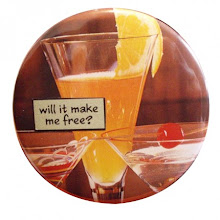Faux amis means "false friends" in French. That's what I hope people don't conclude about me when I exercise poor internet ettiquette! Heh. Faux amis also means "words in different languages that sound like they should have the same meaning, but don't." Second-language learners find faux amis everywhere. They help us stay awake during language classes.
Hebrew and Engish have a surprisingly long chain of faux amis threaded through the p
 ronouns. An American rabbi wrote a cutesy Abbott-and-Costello tribute about it:
ronouns. An American rabbi wrote a cutesy Abbott-and-Costello tribute about it:Abbott: הוא is he.Until someone pointed those out to me, I never noticed them, and I still don't think they sound that much alike. Anyway, there are a lot of crazier faux amis for advanced Hebrew-learners to giggle about in Ulpan. Ahem:
Costello: Who is he?
Abbott: Precisely.
- Nylons (ניילטנים) are the plastic bags you get from the grocery store.

- Purée (פירה) is mashed potatoes.
- Bagel (בייגלה) means bagel, but it also means pretzel.
- Philadelphia (פילדלפיה) means Philadelphia, but it's also the generic name for cream cheese.
- A trapeze (טרפז) is a trapezoid.
- An American exam (מבחן אמריקני) is a multiple-choice test.
- A close (קלוז) is a fill-in-the-blank exercise.
- Your lose (לו"ז) is your schedule.
- A sniff (סניף) is an outlet of a business.
- A filipina (פיליפינה) may be someone from the Phillipines, or she might just be anyone whose job it is to take care of old people. [!עיין ערך גיזאנות]

- Sponge (ספונג'ה) is the name of the job where you clean other people's houses.
- Mommy (מאמי) and boobie (בובי) are terms of endearment.
- The vestigal structure attached to the end of your colon is called your appendicitis (אפנדציטיס). If it gets infected, you have appendetzit (אפנדציט).
- Sylvester (סילבסטר) is the name of the holiday you celebrate on December 31st. ("New Year's Eve" is the name of the holiday we'll celebrate on September 29th.)
- Rashomon (רשומון) is the name of an important Japanese movie, but it's also the Hebrew word for "blog."
- Those are the best. And
- I'm tired of bullet point lists. Which means...
- it is time to fall asleep to a bourekas film! (צ'ארלי וחצי, eh Abba?)




Well, many of these are not true "sound-alikes", but rather just English words that are given a different meaning in Hebrew.
ReplyDeleteSponja, btw, is not "cleaning other people's houses", but rather "washing the floor" (you can do it in your own house too ;-)). It is a specific "technique" of floor-washing that involves a lot of water spilled on the floor, and then collected with a squeegee-like thingy. It is a very Israeli way of floor washing, and I heard of some Israelis trying it in the US on hardwood floors with pretty disastrous results...
Also, appendix is just "appendix" (there is a Hebrew word for it too that hardly anyone uses - "tosaftan"). Those who call it appendicitis are just trying to sound more sophisticated ;-)...
I think Philadelphia being the generic term for cream cheese may be true in a lot of places (it is in Germany, at least)--in the 19th century, we were like the standard for food quality.
ReplyDeleteTimes have changed.
I want more faux amis fridays!
"close" (rather, "cloze") is English for a fill-in-the-blank test too.
ReplyDeletehttp://en.wikipedia.org/wiki/Cloze_test